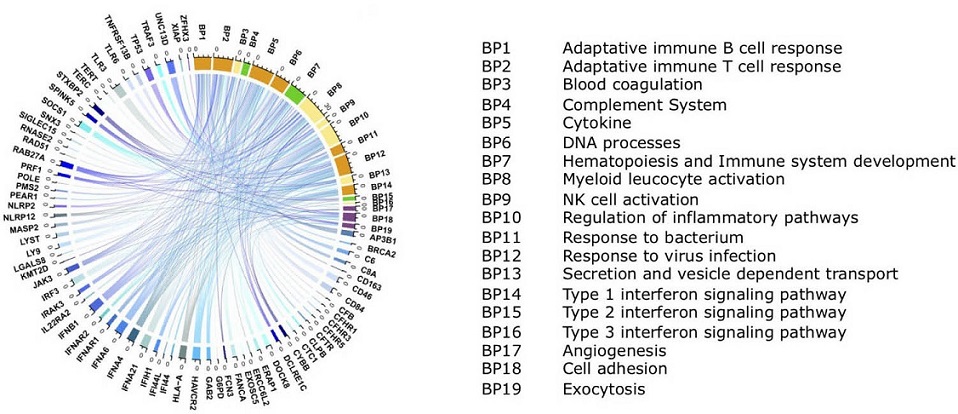COVID-19 News: Rare Genetic Variants And Multisystem Inflammatory Syndrome In Children - Unraveling The Genetic Puzzle
Thailand Medical News Team Aug 20, 2023 2 years, 6 months, 3 days, 21 hours, 26 minutes ago
COVID-19 News: In the wake of the COVID-19 pandemic, a unique and perplexing syndrome emerged in children - the Multisystem Inflammatory Syndrome in Children (MIS-C). As medical professionals grappled with understanding the underlying factors dictating the progression of this syndrome, genetics emerged as a potential key player. A study conducted across multiple centers in Brazil delved into the genetic landscape of MIS-C, shedding light on the role of rare genetic variants in shaping its course.
 Functional relationships between genes with CV (candidate variants) in MISC patients.
Functional relationships between genes with CV (candidate variants) in MISC patients.
Study data and literature data combined and the biological processes (BP) that enrich them according to GO functional enrichment analysis. BPs are indicated by numbers. BPs enriched only by our study genes are in green, BPs enriched only by the literature genes in yellow, BPs that are enriched for both gene sets in orange, and BPs that only appear enriched with the combination of our genes with literature genes in purple. The size of the rectangles is proportional to the involvement of genes in the multiple pathways. Genes from each data set that does not enrich any BP does not appear in the images. The scale outside the circles indicates the number of relationships for each rectangle. Images created using circlize R package in R version 4.0.5. Colors for pathways, genes, and BPs are arbitrary. *Because TERC is not translated into a protein, String Nodes analysis does not include this gene. **We identified 38 genes with CV in MISC patients and other groups had previously described 41 genes. Because we identified CV in 3 genes that had already been described, accounting for those, the current total of genes with CV regarding MISC is 78 genes.
MIS-C: A Puzzle in the Pandemic Landscape
Initially, COVID-19 was observed to have a milder impact on children compared to adults. However, a novel phenomenon known as MIS-C arose, challenging this notion. MIS-C, characterized by a range of symptoms including fever, gastrointestinal distress, cardiac involvement, and hyperinflammation, appeared weeks after the peak of COVID-19 cases, hinting at a complex relationship between the virus and the syndrome. The occurrences were documented in numerous studies and
COVID-19 News reports.
Genetic Factors at Play
Amidst the uncertainty, researchers began exploring genetic factors that might contribute to the diverse outcomes observed in MIS-C patients. This study, conducted in Brazil, aimed to investigate whether innate errors of immunity (IEIs), stemming from monogenic, digenic, or even oligogenic sources, played a role in shaping the trajectory of MIS-C.
Probing the Genetic Landscape
To unravel the genetic mysteries surrounding MIS-C, the study team employed whole exome sequencing (WES) on a cohort of 30 MIS-C patients. The results illuminated a compelling genetic tapestry, linking rare and potentially damaging variants to the development of MIS-C. These variants were identified across 38 different genes, with notable candidates like IFNA21 and IFIH1, previously associated with
MIS-C, as well as novel genes like APOL1, TNFRSF13B, and G6PD.
Pathways to Understanding
Delving deeper, the study uncovered the involvement of 13 key pathways linked to MIS-C development. These pathways, spanning from the complement system and immune system development to hematopoiesis and type II interferon signaling, revealed hitherto unexplored dimensions of the disease. Notably, some pathways emerged as common threads in other immune-related disorders, hinting at shared mechanisms.
Connecting the Dots: From Genes to Phenotypes
The genetic insights garnered from this study underscored the diverse genetic landscape underlying MIS-C. Moreover, the presence of specific variants raised questions about potential links to other immune-related conditions like Kawasaki disease and severe COVID-19. For instance, the prevalence of certain variants like HLA-A, PRF1, and G6PD across multiple patients hinted at genetic commonalities that might contribute to the susceptibility to MIS-C.
Beyond Genetics: The Road Ahead
While this study offered a significant stride toward understanding the genetic underpinnings of MIS-C, the journey is far from over. Acknowledging the study's limitations, such as the absence of a control group and the need for functional tests to validate variant impact, the findings point toward a multidisciplinary approach. Integrating genomics with proteomics, transcriptomics, and other omics methodologies promises a holistic understanding of MIS-C's dynamics.
Implications for Clinical Management
As the study postulates, early genetic detection could pave the way for personalized interventions and preventative strategies for MIS-C. With many immune-related disorders manifesting after exposure to specific pathogens, genetic screening could identify children at risk and guide clinicians in making informed decisions about their care.
Conclusion
In the complex puzzle of MIS-C, genetics emerges as a significant player, shaping the diverse clinical manifestations and outcomes observed in affected children. As research continues to unravel the intricate genetic tapestry of MIS-C, the hope is that a deeper understanding will guide effective interventions, leading to improved outcomes for children grappling with this enigmatic syndrome.
The study findings were published in the peer reviewed journal: Frontiers in Cellular and Infection Microbiology.
https://www.frontiersin.org/articles/10.3389/fcimb.2023.1182257/full
For the latest
COVID-19 News, keep on logging to Thailand Medical News.
Read Also:
https://www.thailandmedical.news/news/covid-19-news-defective-or-mutated-host-osa-genes-found-to-be-related-to-sars-cov-2-induced-multisystem-inflammatory-syndrome-in-children-
https://www.thailandmedical.news/news/activation-of-type-1-dendritic-cells-cd11c-cd141-clec9a-and-exhausted-natural-killer-cells-are-key-drivers-of-post-covid-multisystem-inflammatory-synd
https://www.thailandmedical.news/news/covid-19-discoveries-researchers-uncover-unique-t-cell-receptor-repertoire-in-mis-c-patients-commonly-associated-with-superantigen-selection
https://www.thailandmedical.news/news/breaking-german-study-published-in-journal-claims-autoantibody-release-in-children-after-covid-mrna-vaccination-is-a-risk-factor-for-mis-c
https://www.thailandmedical.news/news/breaking-covid-19-latest-u-s-cdc-warns-that-multisystem-inflammatory-syndrome-typically-found-in-children-now-manifesting-in-numerous-adults
https://www.thailandmedical.news/news/multisystem-inflammatory-syndrome-mis-c-could-be-triggered-by-high-antiviral-antibody-levels-in-covid-19-infected-children
https://www.thailandmedical.news/news/covid-19-alerts-texas-study-shows-children%E2%80%99s-hearts-severely-damaged-by-post-covid-19-multisystem-inflammatory-syndrome-mis-c
